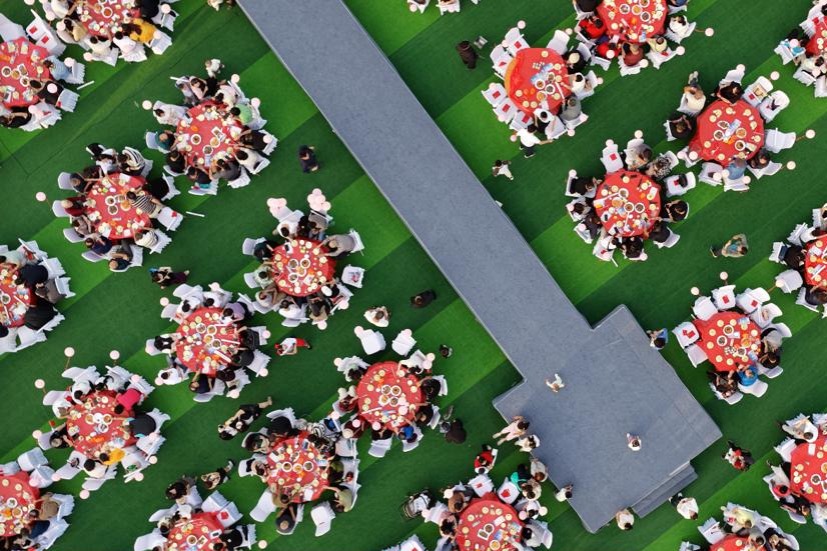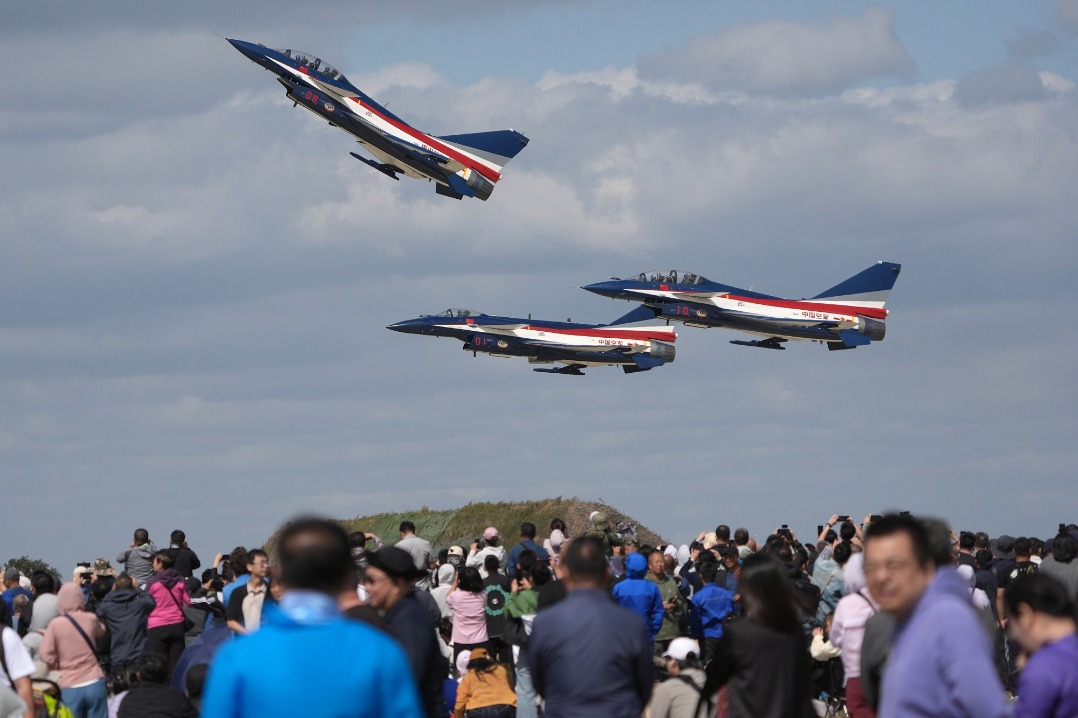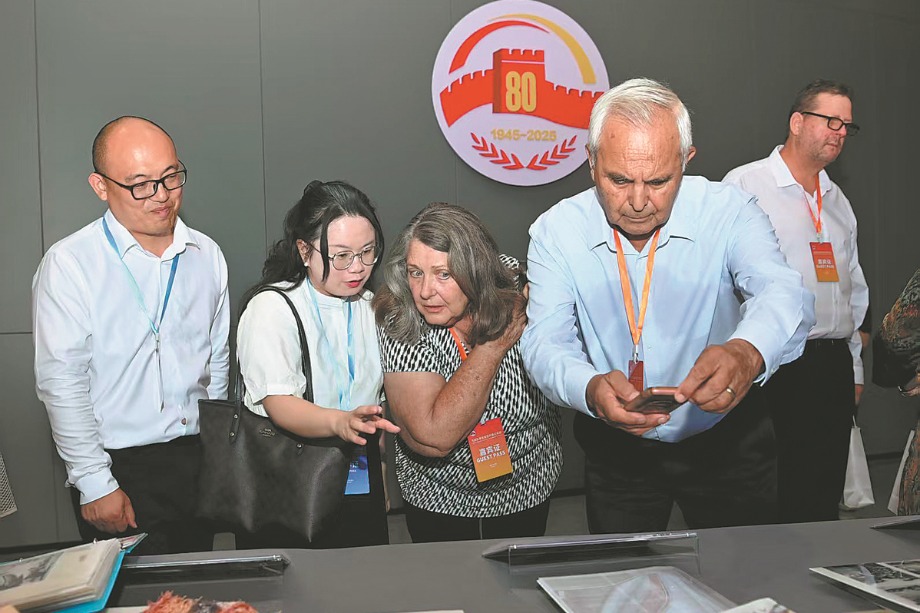National Games — A force to boost integration, shared sense of identity

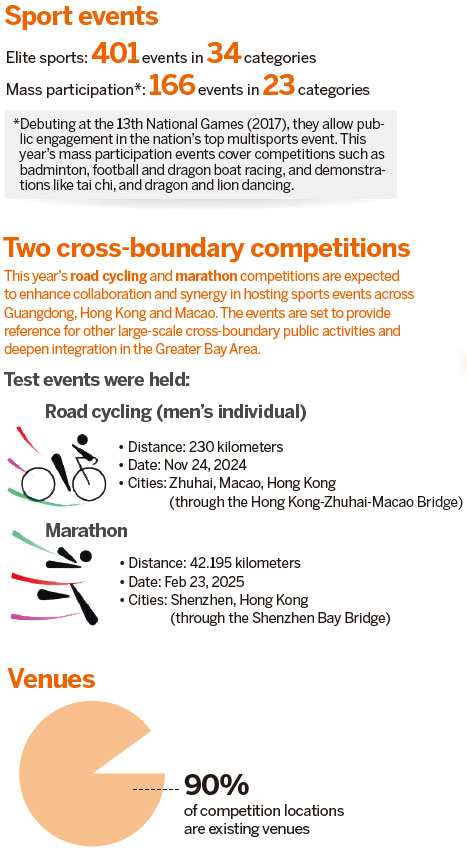
Editor's note: History will be made in November when a Chinese mainland province and the two special administrative regions cohost the National Games for the first time. As today marks the start of the 100-day countdown to the 15th National Games, the fourth installment of China Daily's HK Mosaic series explores how the nation's premier sporting event could accelerate regional integration, strengthen a shared cultural identity and test cross-boundary connectivity.
When Guangdong province, Hong Kong, and Macao join hands in November to host the 15th National Games, they won't be just competing for gold, they'll be rewriting the rules of cross-boundary collaboration in one of China's most dynamic economic hubs — the Guangdong-Hong Kong-Macao Greater Bay Area.
Experts call it a "symbolic stress test" of mobility under "one country, two systems", showcasing the 11-city cluster's goal to be a world-class economic powerhouse.
As the nation's foremost sporting extravaganza, the National Games has represented a high stakes show for athletes since its debut 66 years ago.
The 15th edition — to run from Nov 9 to 21 — will be historic as the first ever to be cohosted by a mainland province and the two special administrative regions.
Sports veterans see it as a milestone in regional integration, setting a precedent for future multicity collaboration that could extend to other major urban hubs like Beijing-Tianjin-Hebei, and the Yangtze River Delta, with Shanghai at its core.
Patrick Lau Wing-chung, a professor at Hong Kong Baptist University's Department of Sports and Health Sciences, says the National Games represents a "huge leap forward" for regional cohesion, fostering unprecedented government cooperation across different systems.
"This process has brought together officials from all the three areas, helping them to adapt to each other's working cultures."
The national event reflects the mega region's resolve to fully unify, rather than stay divided as Guangdong, Hong Kong and Macao — a shift that will better harness the unique strengths of each place for shared prosperity, Lau adds.
This year's National Games will feature 401 elite events in 34 sports categories, with Guangdong staging most of them (350, or 87.3 percent). They'll include two pioneering competitions — the Shenzhen-Hong Kong marathon and the Zhuhai-Macao-Hong Kong road cycling race that will physically connect the Greater Bay Area, testing seamless mobility across the three zones.
"These events demand groundbreaking coordination in areas like customs procedures," says He Junzhi, a Hong Kong and Macao affairs specialist at Sun Yat-sen University in Guangzhou, the capital city of Guangdong.
He cites the successful marathon trial held in February in which Shenzhen and Hong Kong adopted a joint, smart technology command system to streamline cross-boundary processes, logistics and emergency protocols. "Initially designed for athletes, these solutions may eventually enhance travel for all," he says.
Lobo Louie Hung-tak, a sports scholar at the Education University of Hong Kong and a member of the Culture, Sports and Tourism Bureau's Sports Commission, says the contests will bridge a mental divide.
Despite decades of upgrading customs efficiency with more checkpoints and service counters, mental barriers persist due to the regions' different systems, he says.
"The event's symbolic value is profound," says Louie, as it'll foster genuine integration by demonstrating that seamless travel can be achieved despite varying systems.
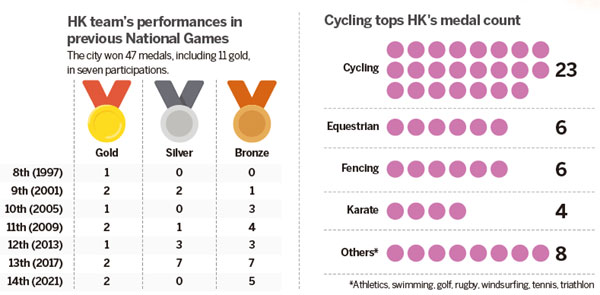
Witness to transformation
As China's most prestigious domestic multisports event, the National Games' hosting rights have long reflected the nation's social and economic evolution.
First held in Beijing in 1959, the event had remained exclusive to the nation's capital and Shanghai until 1987 when Guangdong — then at the forefront of the nation's market reforms — became the first province outside the two traditional hubs to host it, adding punch to national economic transformation.
The green light for the historic joint bid came in 2021 — two years after the central government unveiled an ambitious development plan for the Greater Bay Area, which boasts a combined population of close to 90 million.
The goal is to merge the Chinese mainland's industrial and tech strengths with the global networks of Hong Kong and Macao, lift productivity and further open up the mainland's market to the world.
Achieving this, however, requires overcoming key challenges — coordinating three distinct systems with different political structures, governance models and cultural identities.
Lau believes the 2025 National Games will contribute to narrowing these differences.
"The games will make the integration process tangible," he says, adding that spectators in the host regions will viscerally understand they belong to one interconnected community with a shared destiny and resources.
"If we can successfully blend the spirit of the National Games with the Greater Bay Area's unique culture, we can create a new shared identity for the region," says Sun Yat-sen University's He.
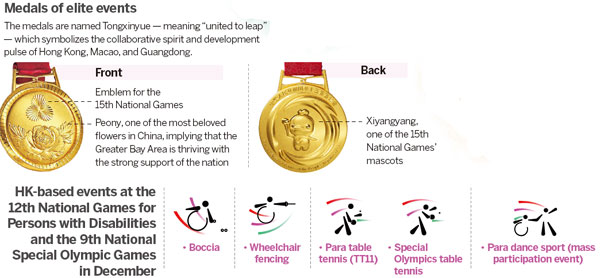
Healthier future
At Hong Kong's debut in the 1997 National Games — shortly after the city's return to the motherland — it won a gold medal in road cycling, making a strong mark in competitive sports.
Over the years, Hong Kong has amassed an impressive 47 medals (11 golds, 13 silvers and 23 bronzes), with cycling as its most successful sport — contributing 10 golds and nearly half of the city's total medals haul. Fencing has also played a key role, securing six medals so far.
As Hong Kong prepares to host several events during the 15th National Games, its selection of home-ground competitions, such as track cycling, fencing, golf and the rugby sevens, reflects the city's historical strengths and mass appeal among local fans.
Pundits suggest that Hong Kong's strategic focus could promise another medals bonanza on home soil.
Beyond elite success, this arrangement can energize mass sports participation, fostering a culture of fitness that will improve public health and ease the long-term pressure on healthcare spending.
In Louie's view, Hong Kong, by leveraging its elite achievements to inspire grassroots engagement, isn't merely chasing medals. It's investing in a healthier and more active future.
The much-anticipated events to be held at Hong Kong's new HK$31.9 billion ($4.06 billion) Kai Tak Sports Park — including fencing and the rugby sevens - testify to the city's commitment to a mega-events economy strategy, following sold-out successes with Coldplay concerts.
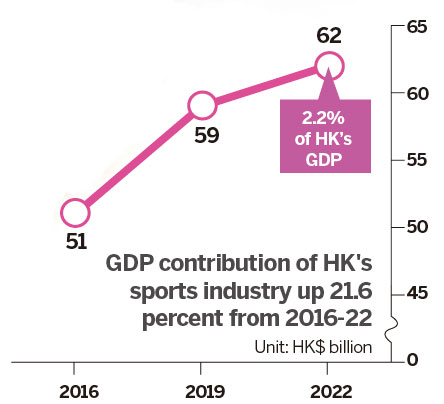
Ripple effect
The National Games' high-profile contests will help Hong Kong swell visitor spending, create jobs and showcase its world-class venues.
Simon Wong Ka-wo, president of the Hong Kong Federation of Restaurants and Related Trades, is bullish about the economic benefits from the upcoming major sporting events.
He expects a 15 percent year-on-year increase in the number of trips made by mainland visitors — about 400,000 more than those of November last year.
The surge in tourist trips, combined with the traditional year-end spending boom, should push the catering sector's revenue to above HK$10 billion in November, predicts Wong. "That would represent 15 percent growth from last year's earnings — a significant boost for us."
He says the federation will collaborate with the tourism authorities in creating special gourmet guides, offering targeted dining discounts and promotions, developing sports-themed culinary events, and enhancing media campaigns to attract food lovers.
Yang Jinsong, director of the department of international exchange and finance at the China Tourism Academy in Beijing, agrees that such optimism is well-founded.
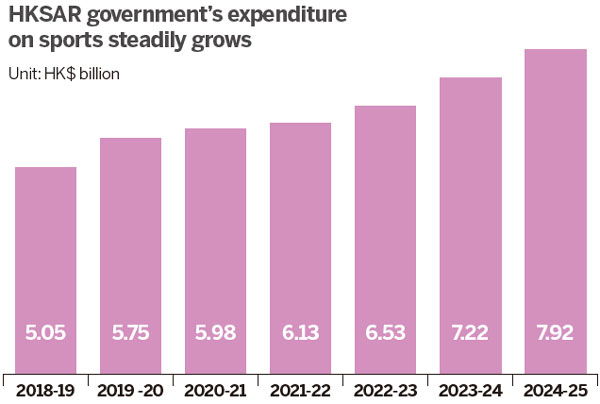
With mainland residents making nearly 146 million outbound trips last year, he says: "We have a substantial base of potential cross-boundary spectators."
Yang anticipates that young urbanites and families from nearby areas like the Guangxi Zhuang autonomous region and Hunan province will likely form the core audience. "This demographic demands tailored services from both Hong Kong and mainland travel agencies and caterers."
He points to the Greater Bay Area's "one-hour living circle" as a game changer, with its integrated transport network of ferries, high-speed rail and expressways perfectly suited for travel.
However, there's one caveat. "While we're prepared for the rise in visitor numbers, blockbuster events will push Hong Kong's reception capacity to its limit," warns Yang.
A growing number of visitors now opt for same-day trips rather than overnight stays, leading to intense crowding when events begin and end.
For instance, after Coldplay's concert ended at around 10:30 pm on April 8 — its first day — thousands of mainland attendees swamped checkpoints to return to Shenzhen, with about 12,000 visitors leaving through Huanggang Port alone within four hours, setting a late night record.
"Robust emergency planning and cross-boundary coordination will be absolutely critical," Yang says.

- Sino-South Korean youth environmental program opens in Hainan
- Chinese and ASEAN experts call for more cooperation on maritime issues
- Court orders confiscation of former senior official's assets
- Intl forum on river-based civilizations attracts foreign and Chinese scholars, officials
- Chinese youth music festival makes overseas debut in Singapore
- Guangzhou airport records over 42% rise in entry-exit visits from ASEAN

















